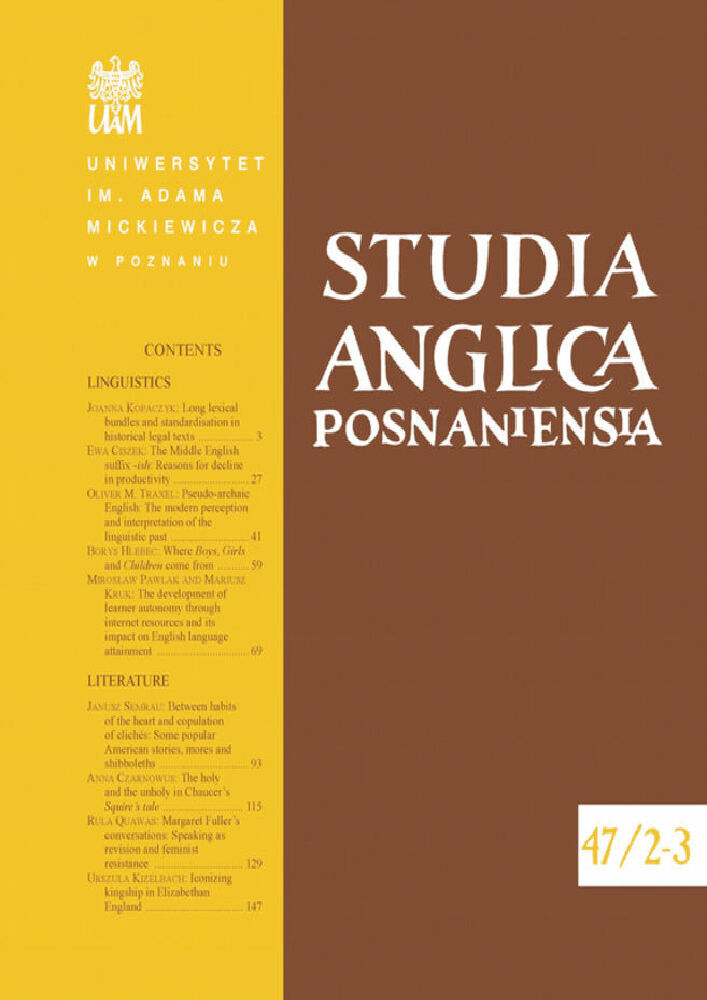Abstract
This paper explores the potential of legal documents for the study of the sociology of Old English. It gives a rationale for the use of legal genres, or charters, and introduces research databases and tools that may elucidate the interconnections between practitioners of legal Old English and their linguistic practices. A series of short case studies on wills illustrates what legal genres tell us about the correlation between linguistic variation, supralocalisation, and change and such variables as archive and gender.
References
Allen, Cynthia L. 1995. Case marking and reanalysis: Grammatical relations from Old to Early Modern English. Clarendon Press.
Bammesberger, Alfred. 1998. The Germanic preterite-present *ann/unn. NOWELE 34(1). 15–21. DOI: https://doi.org/10.1075/nowele.34.02bam
Bergs, Alexander. 2005. Social network and historical sociolinguistics: Studies in morphosyntactic variation in the Paston Letters (1421–1503). De Gruyter Mouton. DOI: https://doi.org/10.1515/9783110923223
Britt, Brian. 2007. Ethnic curses as “last resort of the weak” in Genesis 9:18–28 and Joshua 9: 22–27. In Alexandra Cuffel & Brian Britt (eds.), Religion, gender, and culture in the pre-modern world, Palgrave Macmillan. 25–45. DOI: https://doi.org/10.1057/9780230604292_2
CEEC = Corpus of Early English Correspondence. 1998. Compiled by Terttu Nevalainen, Helena Raumolin-Brunberg, Jukka Keränen, Minna Nevala, Arja Nurmi & Minna Palander-Collin at the Department of Modern Languages, University of Helsinki. https://varieng.helsinki.fi/CoRD/corpora/CEEC/ (accessed on 15 July, 2021).
Culpeper, Jonathan & Merja Kytö. 2010. Early Modern English dialogues: Spoken interaction as writing. Cambridge University Press.
Danet, Brenda & Bryna Bogoch. 1992. “Whoever alters this, may God turn his face from him on the day of judgment”: Curses in Anglo-Saxon legal documents. Journal of American Folklore 105(416). 132–165. DOI: https://doi.org/10.2307/541083
Danet, Brenda & Bryna Bogoch. 1994. Orality, literacy, and performativity in Anglo-Saxon wills. In John Peter Gibbons (ed.), Language and the law, 100–135. Longman.
DOEC = The Dictionary of Old English Corpus in Electronic Form. 2009. Compiled by Antonette diPaolo Healey, with John Price Wilkin & Xin Xiang. University of Toronto. http://tapor.library.utoronto.ca/doecorpus/ (accessed on 15 July, 2021).
Drout, Michael. 2000. Anglo-Saxon wills and the inheritance of tradition in the English Benedictine reform. Selim 10. 5–53. DOI: https://doi.org/10.17811/selim.10.2000.5-54
The Electronic Sawyer, Online catalogue of Anglo-Saxon charters. 2021–. Compiled by Simon Keynes, Susan Kelly, Sean Miller, Rebecca Rushforth, Rory Naismith, David Pelteret, Levi Roach & David Woodman. King’s College London. https://esawyer.lib.cam.ac.uk/ (accessed on 15 July, 2021).
Kytö, Merja & Matti Rissanen. 2011 [1993]. General introduction. XML Helsinki Corpus Browser. https://helsinkicorpus.arts.gla.ac.uk/essays.py?fs=100&what=genintro (accessed on 15 July, 2021).
MELD = A Corpus of Middle English Local Documents, Version 2017.1. December 2020. Compiled by Merja Stenroos, Kjetil V. Thengs & Geir Berstrøm. University of Stavanger. http://www.uis.no/meld (accessed on 15 July, 2021).
Mitchell, Bruce. 1985. Old English syntax. Clarendon Press. https://doi.org/10.1093/acprof:oso/9780198119357.001.0001
Moessner, Lilo. 2018. Old English wills: A genre study. In Peter Petré, Hubert Cuyckens & Frauke D’hoedt (eds.), Sociocultural dimensions of lexis and text in the history of English, John Benjamins. 103–124. DOI: https://doi.org/10.1075/cilt.343.05moe
Mustanoja, Tauno. 1960. A Middle English syntax, part 1: Parts of speech. Société Néophilologique.
Nevalainen, Terttu & Helena Raumolin-Brunberg. 2016. Historical sociolinguistics: Language change in Tudor and Stuart England (2nd edn). Routledge. https://doi.org/10.4324/9781315475172
Open Domesday. 2011. Compiled by Anna Powell-Smith & John J. N. Palmer. https://opendomesday.org (accessed on 15 July, 2021).
PASE = Prosopography of Anglo-Saxon England. 2010. http://pase.ac.uk/ (accessed on 15 July, 2021).
Sawyer, Peter Hayes. 1968. Anglo-Saxon charters: An annotated list and bibliography. Offices of the Royal Historical Society.
Schwyter, Jürg R. 1996. Old English legal language: The lexical field of theft. Odense: Odense University Press. DOI: https://doi.org/10.1075/nss.15
Scott, James C. 1986. Weapons of the weak: Everyday forms of peasant resistance. Yale University Press.
Sheehan, Michael M. 1963. The will in medieval England: From the conversion of the Anglo-Saxons to the end of the thirteenth century. Pontifical Institute of Medieval Studies.
Stenroos, Merja & Kjetil V. Thengs (eds.). 2020. Records of real people: Linguistic variation in Middle English local documents. John Benjamins. DOI: https://doi.org/10.1075/ahs.11
Timofeeva, Olga. 2022. Sociolinguistic change in Old English: Records of communities and people. John Benjamins. DOI: https://doi.org/10.1075/ahs.13
Tollerton, Linda. 2011. Wills and will-making in Anglo-Saxon England. York Medieval Press & Boydell & Brewer.
Whitelock, Dorothy (ed.). 2011 [1930]. Anglo-Saxon wills. Cambridge University Press.
Williams, Ann. 1995. The English and the Norman Conquest. Boydell Press.
Wojtyś, Anna. 2017. The non-surviving preterite-present verbs in English: The demise of *dugan, munan, *-nugan, *þurfan, and unnan. Peter Lang. https://doi.org/10.3726/b11514
